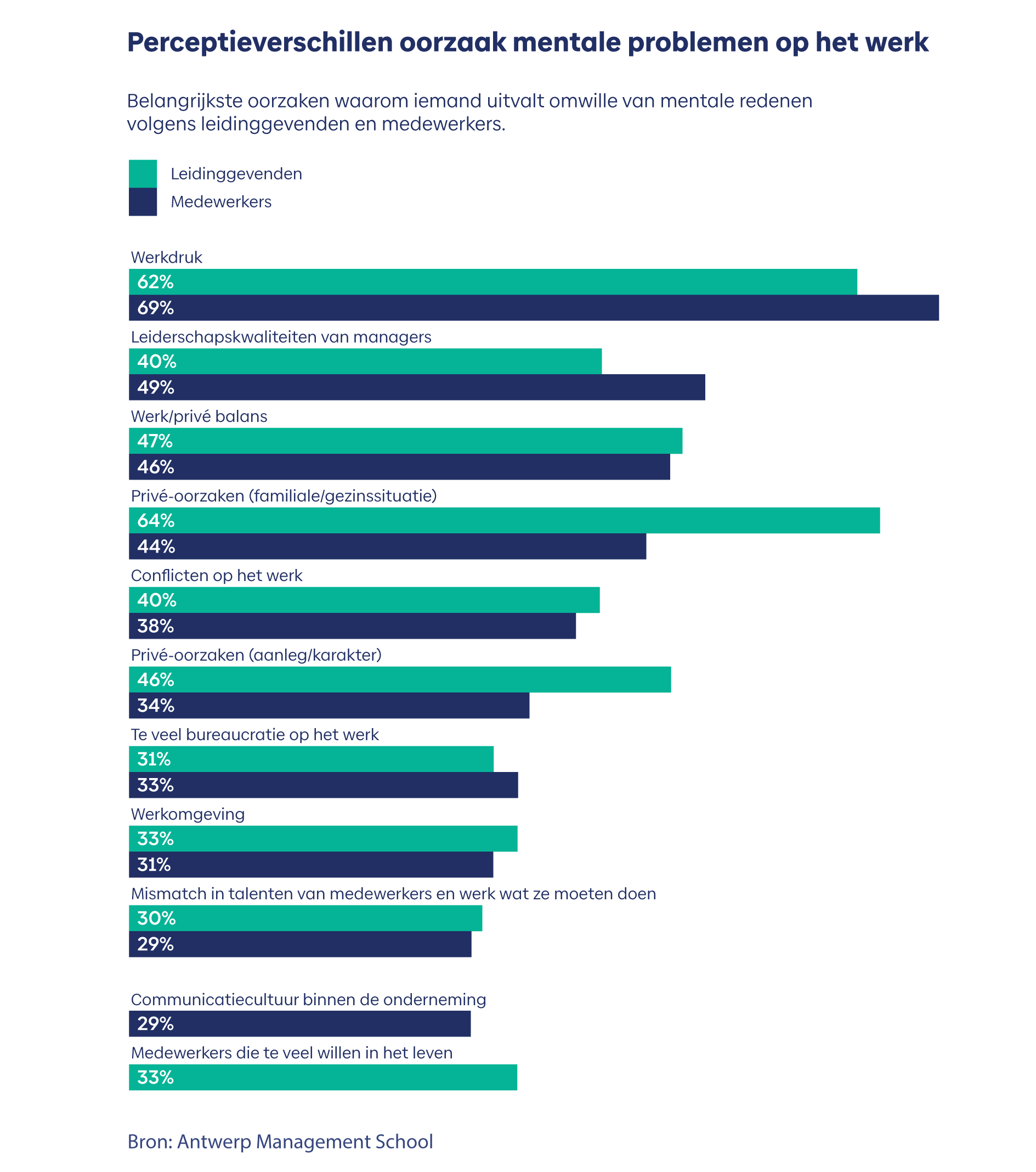Mental health: risk for the organization
More and more companies are focusing on their employees’ mental health issues. However, nearly half (48%) of Belgian managers believe that employees with mental health problems can emotionally burden their colleagues. This finding comes from new research conducted by Antwerp Management School. In fact, a quarter of them (24%) say they would not hire someone with a history of mental health problems.
From fruit subscriptions and yoga classes to after-work drinks, initiatives aimed at promoting mental well-being in the workplace are increasingly common. Whether they make a significant difference remains to be seen. The current situation is indeed not promising. In a large-scale survey conducted by Antwerp Management School, 28% of respondents have experienced stress-related conditions, 21% have experienced depression, 19% have experienced burnout, and 17% have experienced anxiety disorders. At the same time, 53% of employees either cannot or do not dare to discuss their mental health issues with their supervisor.
Insufficient knowledge and support.
Managers play a crucial role in promoting mental well-being in the workplace. Although 80% of them are willing to make adjustments where possible, the majority struggle when dealing with employees experiencing mental health issues. Fifty-four percent indicate they lack sufficient knowledge to provide support, and 44% feel they are not competent enough.
Part of the problem may indeed lie within the organization itself. Nearly four in ten (37%) managers do not feel adequately supported by their organization to assist employees with mental health problems. Additionally, 40% have never received any form of psychological support, coaching, or lectures on prevention, while 70% have never received any training or further education. However, six out of ten managers acknowledge that it is their responsibility to support their employees.
Mental health issues are seen as a risk for the organization.
Managers want to support employees with mental health problems and meet their needs, but they lack concrete tools to do so. An astonishing 57% find it stressful to work with employees who have mental health problems.
Moreover, almost half (46%) of managers consider these employees as a risk to the organization and fear they may emotionally burden other colleagues (48%). A quarter of managers would not have hired these individuals if they had known about their mental health problems in advance, and 7% are even actively trying to dismiss them.
Perception differences cause mental problems at work
The research also indicates that managers attribute the cause of mental problems elsewhere than employees. According to managers, the primary reason for someone being absent due to mental health problems is related to personal matters, such as family or home situations. They also consider ’employees who want too much in life’ a top cause, which is not echoed by the employees themselves. Employees experience work pressure as the biggest problem.

Prevention of mental health problems.
Mental well-being in the workplace is clearly not straightforward,” says Eva Geluk, senior researcher at Antwerp Management School.
“Moreover, prevention is still primarily viewed as a necessary intervention when things go wrong, but by then, it is actually too late. You have to prevent it altogether, which requires more than just a weekly fruit basket. It’s noteworthy that while employees perceive work pressure as the biggest problem, managers don’t prioritize reducing that work pressure in their top 10 concrete actions for prevention.”
At the same time, the study shows that executives who think less stigmatizingly take more preventive actions. “Creating a psychologically safe environment where employees feel free to talk about their problems requires collaboration on multiple levels. Their decision to talk depends on their assessment of possible positive or negative consequences. The relationship with the manager plays a crucial role in this, as does the support from the organization itself,” concludes Eva Geluk.
Research details
- Conducted by: Antwerp Management School (senior researcher Eva Geluk)
- Collaboration with: bpost, B-Tonic, Elia
- Respondents: 2,428 (755 executives, 1,397 employees, 276 HR/prevention/welfare)
- Methods: Quantitative survey (2,428) & qualitative interviews/focus groups (56 executives)
- Period: June 2023 – March 2024
- More info: Research on effective wellness interventions




